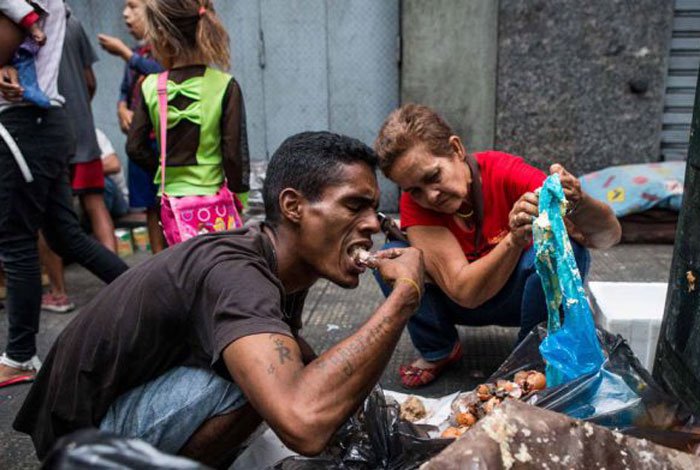economic crisis Venezuela
Crisis, poverty, violence, scarcity. All those words describe the current situation in Venezuela. The Government of Nicolás Maduro does not find a way to recover calm in the streets, and every day hundreds of Venezuelans leave the country without plans to return. How did they get to this situation? This note summarizes it in six points.
- Oil drop
The Venezuelan economy depends on the sale of crude oil. Between 2013 and 2014, the international price per barrel exceeded $ 100, but in 2016 it reached $ 26, the lowest level in the last 12 years. Currently, it is around 56 dollars. The economist of Barclays Capital, Alejandro Arreaza, told CNN Español that in 2014 oil meant $ 75 billion for Venezuela, but last year that figure fell to $ 27 billion.
- Lack of food
As the State has less and less money, it can no longer pay for the importation of certain products such as milk, flour, eggs and some medicines. That's why the shelves of many stores are empty. The images of long queues outside bakeries and stores with almost no products for sale are already famous.
- Devaluation of the currency
In 2015, a dollar was worth 175 bolivars. Today the same ticket can be worth 14 thousand bolivars. According to figures from S & P, quoted by Bloomberg, this year's inflation is expected to reach 950%. Prices have skyrocketed and the average salary is insufficient. The Survey on Living Conditions in Venezuela 2016 (Encovi) revealed that more than 80% of Venezuelans live below the poverty line and that one third of the population eats less than three times a day.
The study published by the Central universities of Venezuela, Católica Andrés Bello and Simón Bolívar, and several NGOs, differs from the official figures. The administration of Nicolás Maduro has said that poverty is decreasing and in 2016 it placed the figure below 22%.
- Political crisis
The opposition ensures that Venezuela lives a dictatorship. This Friday, the chavista Constituent National Assembly signed a decree dissolving the opposition majority parliament. The Chavez regime has governed since 1999. Hugo Chávez won four trials, three of which were questioned by the opposition.
After Chávez's death in 2013, then Vice President Nicolás Maduro took office and won the presidential election that year in a process that was described as fraud. Opposition politician Leopoldo López was sentenced to 13 years in prison for summoning and leading a march that ended with the death of 40 people from both sides in the streets. His wife, Lilian Tintori, has reported that the government has subjected him to torture in prison.
- Protests in the streets
After three periods under Chavez control, in 2015 the opposition won the majority of the seats in Congress. However, Nicolás Maduro called this year to an electoral process to elect a National Constituent Assembly, which will be responsible for introducing changes in the Constitution. Different politicians, analysts and civil organizations criticized that this process has been approved without a previous referendum.
This triggered new protests throughout the country that ended with more than 120 deaths. However, the Assembly was elected on Sunday, July 30 and its conformation is a Chavez majority. The biggest problem is that the Constituent Assembly has the power to dissolve Parliament if it deems it necessary. The opposition fears that this may happen in the coming days.
- Surrounding the media
"In 2016, all the conditions of the exercise of journalism in Venezuela were compromised and were infiltrated to restrict this office, to a greater or lesser extent," said a recent report published by the Press and Society Institute of Venezuela (IPYS). The opposition has complained for more than a decade that Chavismo has cut press freedom in the country (and continues to do so).
In another report titled Owners of censorship, IPYS also denounced that in the last five years, at least 25 media were sold to businessmen linked to the government. This process became the line change of the media, now less critical with the management of Maduro.
At the beginning of 2017, the Venezuelan government ordered cable operators to cut signals from CNN and CNN Español because both "incite hatred."
